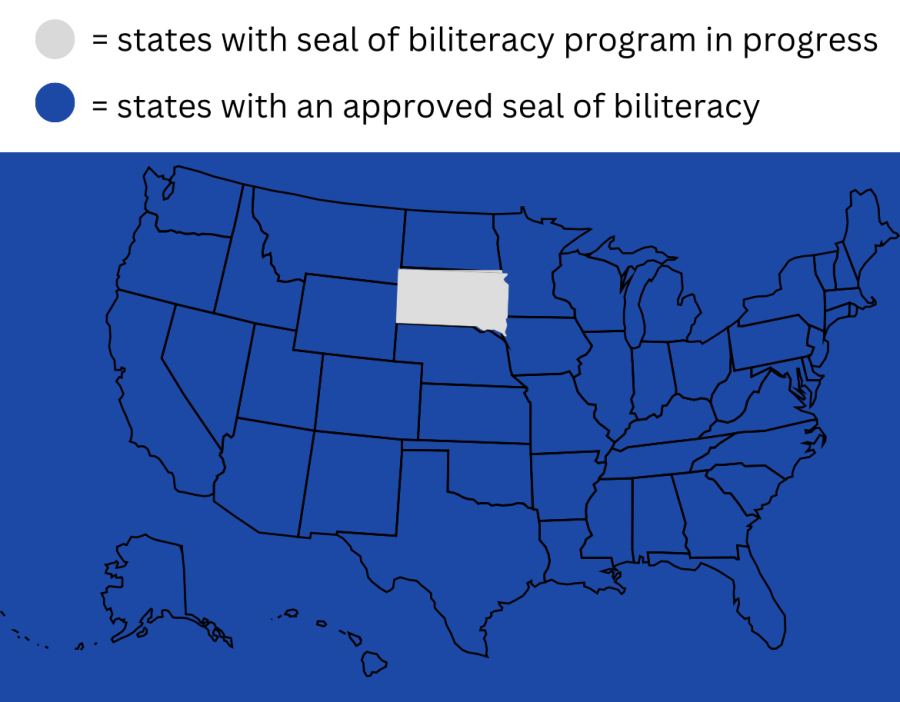Requirements should change to promote biliteracy
Currently, 49/50 states have approved Seals of Biliteracy, with the final one on the way. Getting this award is highly beneficial for students in the future.
March 26, 2023
Welcome to the start of this article on why world language classes should be required for all four years of high school. Bienvenido al comienzo de este artículo sobre por qué las clases de idiomas extranjeros deberían ser requeridas para todo de los cuatro años de la escuela secundaria. Bienvenue au début de cet article sur les raisons pour lesquelles les cours de langues du monde devraient être obligatoires pendant les quatre années d’ école secondaire.
While it would be a bit outlandish to expect most students to be able to comprehend what that singular sentence meant in all three languages, before graduating high school all students at WCHS should be proficient enough in a second language that they can make conversation and have simple literacy skills. To achieve this it is imperative that students, unless met with extenuating circumstances, are enrolled in a world language class for all four years of high school.
A study from the University of Washington on Oregon and California residents from a variety of language backgrounds showed that those who spoke multiple languages tended to think quicker and were more accurate when trying to interpret other new languages they did not know. The ability to think accurately in a timely manner is very important for successful students during multiple-choice exams or timed writing exams. Having more students gain these skills through learning multiple languages throughout all years of high school will help WCHS to have higher-achieving students.
On a similar note, an article from The Washington Post highlighted how students who either grew up in multilingual households or learned multiple languages in school have an easier time getting into elite colleges. As a school that prides itself on the academic prowess and well-roundedness of its students, WCHS must be a part of the change to better prepare students for their next step educationally.
Furthering this, according to a paper published by the United States Department of Education, approximately 56 percent of adults globally speak multiple languages, while only 20 percent of Americans can. However, that 20 percent has a higher probability of getting a job and making higher wages. If MCPS truly cares about the future success of its students, then they should be recognizing the importance of biliteracy to a greater degree than they currently are.
To maximize the benefits that learning multiple languages has on a young adult, the MCPS system should increase the graduation requirement for world language credits from two to four so that students are taking it for all four years. To make sure this could be applied within WCHS, new courses such as the newly made Spanish 7 should be created to accommodate upper-level foreign language students who still need to take a world language for all four years.
While many students will benefit from having world language classes required for all four years of high school, there are some that are in circumstances where world language classes may not be as important. Some may be learning English as a second language, some may already be biliterate due to growing up in multilingual households, or some might have learning disabilities making learning multiple languages extremely difficult. That is why with this solution students would be able to discuss their circumstances with a school counselor to become language-exempt.
Additionally, while the creation of new classes can be seen as a burden on the school’s teachers and budget, it also would elevate the world languages subject to that of others that have extensive electives like social studies and science. This is necessary to show the importance that world languages can have on students and legitimizes world languages as a part of the core curriculum.
To conclude, the learning development of languages beyond English for WCHS students is imperative in order to build a well-rounded, high-achieving community that will go on to be successful in both college and the professional world. Therefore, WCHS and the MCPS systems must change the current graduation and credit policies to stress the importance of learning world languages to a greater extent and have students take said classes for more than just a couple of years.



